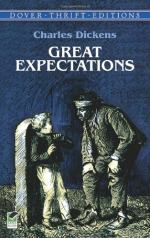My inn had once been a part of an ancient ecclesiastical house, and I dined in a little octagonal common-room, like a font. As I was not able to cut my dinner, the old landlord with a shining bald head did it for me. This bringing us into conversation, he was so good as to entertain me with my own story — of course with the popular feature that Pumblechook was my earliest benefactor and the founder of my fortunes.
“Do you know the young man?” said I.
“Know him!” repeated the landlord. “Ever since he was — no height at all.”
“Does he ever come back to this neighbourhood?”
“Ay, he comes back,” said the landlord, “to his great friends, now and again, and gives the cold shoulder to the man that made him.”
“What man is that?”
“Him that I speak of,” said the landlord. “Mr. Pumblechook.”
“Is he ungrateful to no one else?”
“No doubt he would be, if he could,” returned the landlord, “but he can’t. And why? Because Pumblechook done everything for him.”
“Does Pumblechook say so?”
“Say so!” replied the landlord. “He han’t no call to say so.”
“But does he say so?”
“It would turn a man’s blood to white wine winegar to hear him tell of it, sir,” said the landlord.
I thought, “Yet Joe, dear Joe, you never tell of it. Long-suffering and loving Joe, you never complain. Nor you, sweet-tempered Biddy!”
“Your appetite’s been touched like, by your accident,” said the landlord, glancing at the bandaged arm under my coat. “Try a tenderer bit.”
“No thank you,” I replied, turning from the table to brood over the fire. “I can eat no more. Please take it away.”
I had never been struck at so keenly, for my thanklessness to Joe, as through the brazen impostor Pumblechook. The falser he, the truer Joe; the meaner he, the nobler Joe.
My heart was deeply and most deservedly humbled as I mused over the fire for an hour or more. The striking of the clock aroused me, but not from my dejection or remorse, and I got up and had my coat fastened round my neck, and went out. I had previously sought in my pockets for the letter, that I might refer to it again, but I could not find it, and was uneasy to think that it must have been dropped in the straw of the coach. I knew very well, however, that the appointed place was the little sluice-house by the limekiln on the marshes, and the hour nine. Towards the marshes I now went straight, having no time to spare.
Chapter 53
It was a dark night, though the full moon rose as I left the enclosed lands, and passed out upon the marshes. Beyond their dark line there was a ribbon of clear sky, hardly broad enough to hold the red large moon. In a few minutes she had ascended out of that clear field, in among the piled mountains of cloud.




